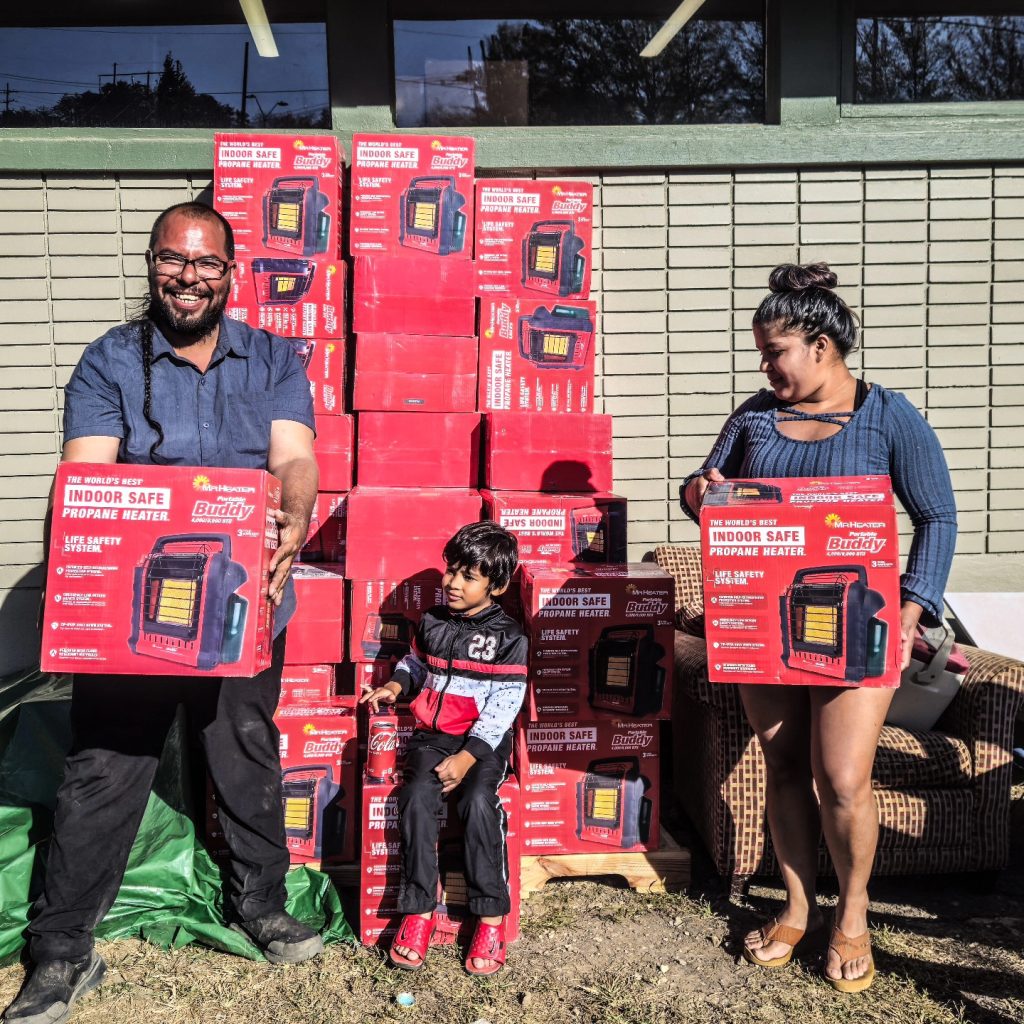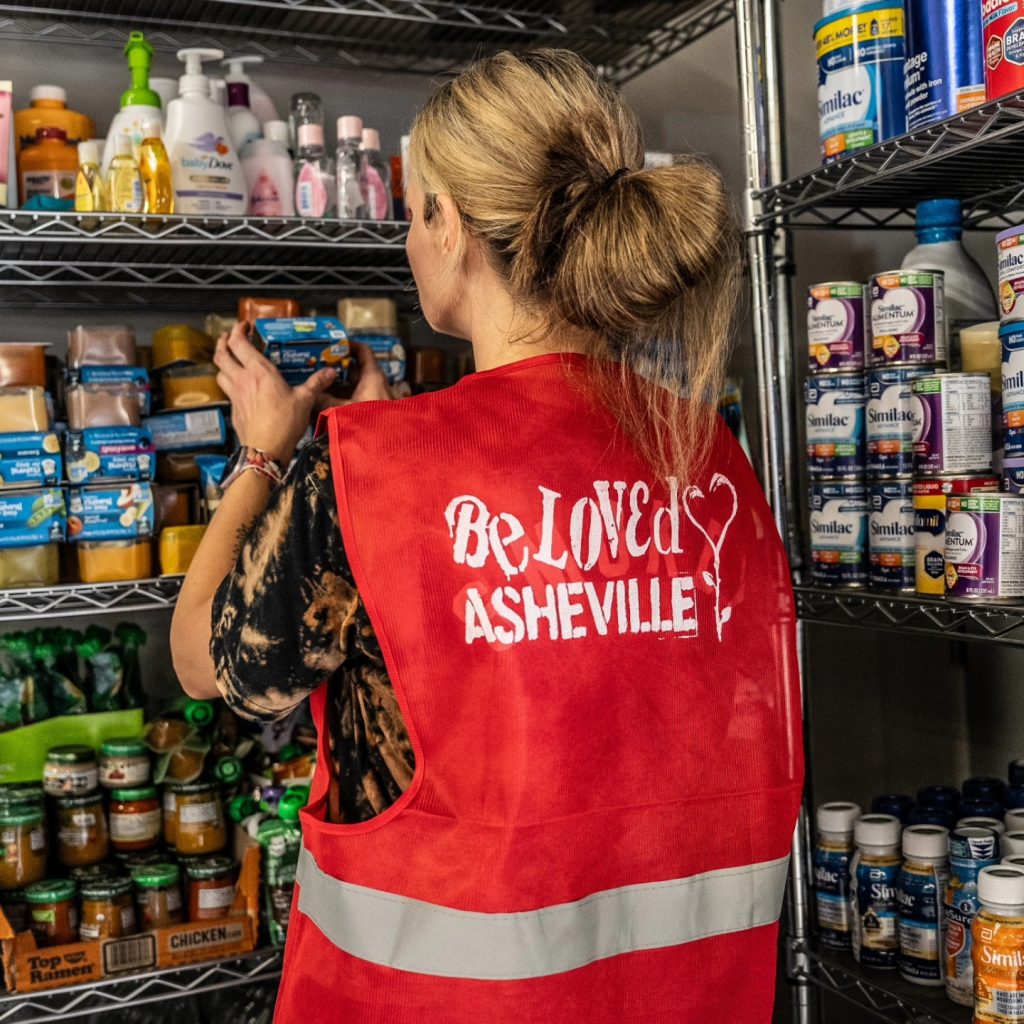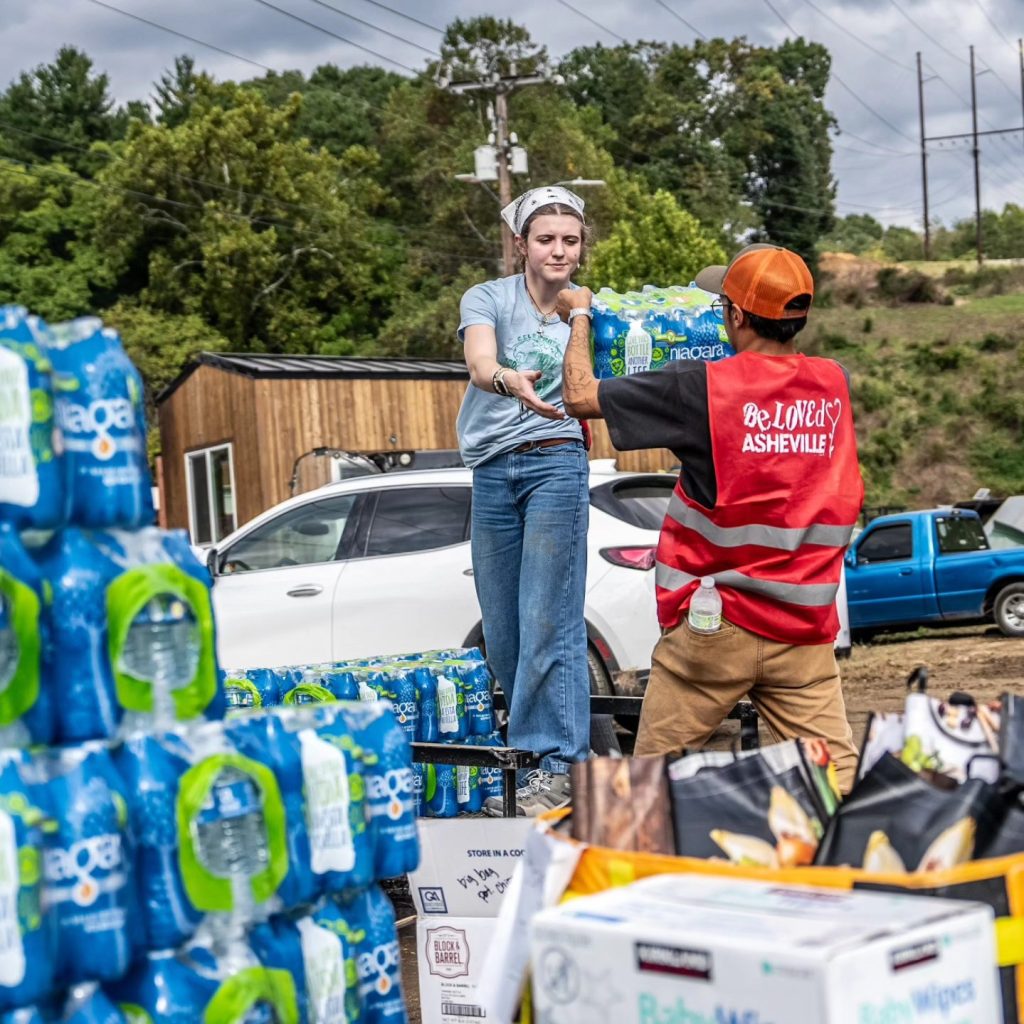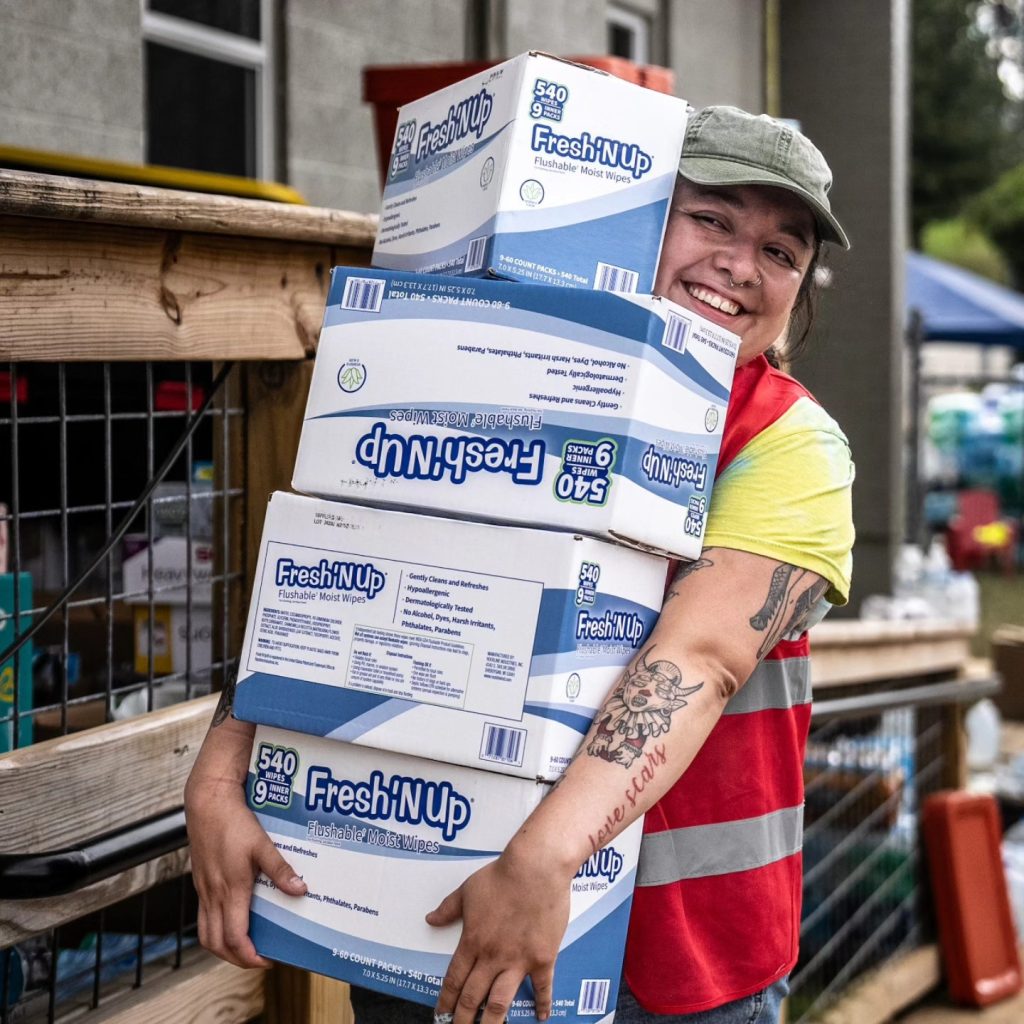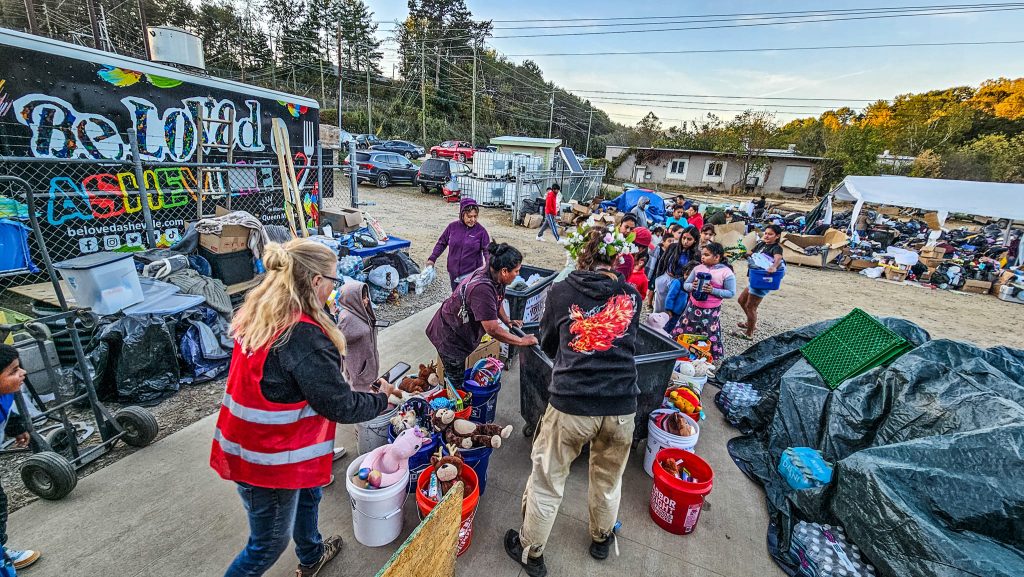Communities across East Tennessee, Western North Carolina and surrounding areas rally to recover from Helene’s wrath
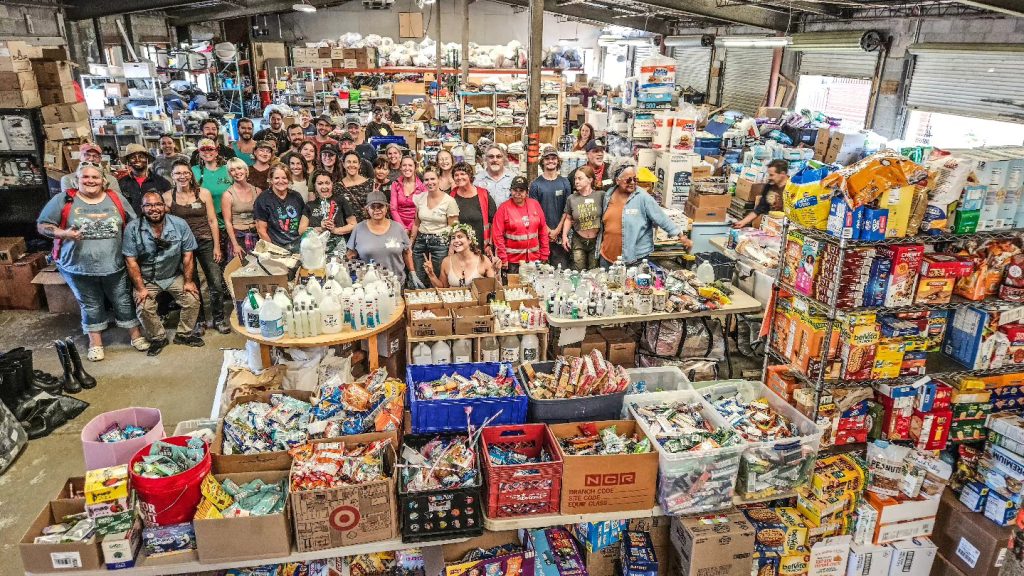
Mountain folks are often characterized as rugged individualists used to fighting to eke out a living, battling against rocky soil; tough economic situations; marginalizing government entities; and sometimes even each other to do so. Appalachians are used to operating independently to achieve their goals, though they also are known to be fiercely loyal to family, friends and neighbors.
Something that Appalachians residing in the converging regions of East Tennessee, Western North Carolina and Southwestern Virginia have not had to contend with for generations is extreme, historical, life-threatening weather. Southern Appalachia is categorized as a deciduous temperate rainforest, and the mountains typically shield folks in this area from the intense weather intrusions faced by people in other parts of the country: blizzards in the North; tornadoes in the Midwest and Great Plains; wildfires and drought in the West; and the hurricanes that plague the coastal Southeast.
Hurricane Helene changed all of that beginning on the morning of Friday, Sept. 27, as the powerful storm system surged farther north than initially expected and ravaged Southern Appalachia – already saturated with three days of heavy precipitation – with strong winds, torrential rains, mudslides and the worst flooding the region had experienced in over a century. The impacts varied locally, but reports abounded across the region of winds exceeding 100 miles per hour and torrential rains accumulating in the dozens of inches, resulting in raging rivers rising multiple feet in a matter of hours, spilling into nearby towns, downing trees and power lines and destroying homes, businesses and even entire communities.
Whole downtowns, like those of Newport, Tennessee, and Damascus, Virginia, were inundated with water. Parts of Greeneville, Tennessee, and Spruce Pine, North Carolina, were washed away. Important bridges on I-26, I-40 and highways 58 and 107 collapsed, completely cutting off access to already isolated communities and stopping both commuter and commercial traffic. Worse still, entire municipalities, such as Erwin in Tennessee and Chimney Rock and Lake Lure in Western North Carolina, were overwhelmed by rushing flood waters, with the vast majority of their buildings either damaged or totaled. The full scale of the human toll may never be realized, but the number of known casualties is significant, and the loss is profound.
While reports about the ruining effects of Helene continue to be published by both local and national media, this story will focus on some of the helpers – the folks who either sprang into action as early leaders in their communities or bore witness to seemingly miraculous community efforts to survive and help each other sustain through the storm and its effects (lack of water, power, supplies and infrastructure) that are expected to linger for days, weeks, months and potentially even years.
The following are a few accounts of folks who felt compelled to help in the face of daunting adversity. We start with the experiences of folks closer to BLANK’s home base in Knoxville before exploring some of the efforts within the Scruffy City itself. We then take a brief look at goings-on in Nashville before expanding our focus to include detailed coverage of what folks in Asheville and the hardest-hit portions of Western North Carolina have been doing.
East Tennessee and Nashville
Greeneville
Former WUTK station director Benny Smith is a Greeneville boy, born and raised, and it affected him deeply to see his beloved hometown bear a major part of Helene’s brunt.
“It is still so surreal,” Smith laments.
Knowing he was from Greeneville, a fellow parishioner at St. John’s Lutheran Church in Knoxville got in touch with Smith and asked him where they could deliver supplies. They ended up getting them to the St. James community near Caney Branch, an area Smith acknowledges is close to his heart, as his family on one side is from that part of Greene County.
Smith planned to go on a subsequent run, and he was joined on it by BLANK publisher Rusty Odom, who already had a benefit show lined up at Barley’s and was wanting to survey some of the damage incurred in Cocke and Greene counties and surrounding areas. Before leaving, they received a call from Jimmy Buckner of XHunger, who had written a $2,500 check he requested that they deliver.
“I cannot thank Jimmy and X[Hunger] enough for that kind donation and for thinking of me and my hometown like that,” Smith says.
He and a few others were able to deliver the check and four trucks of water and other supplies on that trip. As they traveled through Newport, Smith was happy to see that the Waterville Dam – much like how the Nolichucky Dam had withstood raging flood waters – luckily had not broken, but he was astounded by all the destruction they encountered.
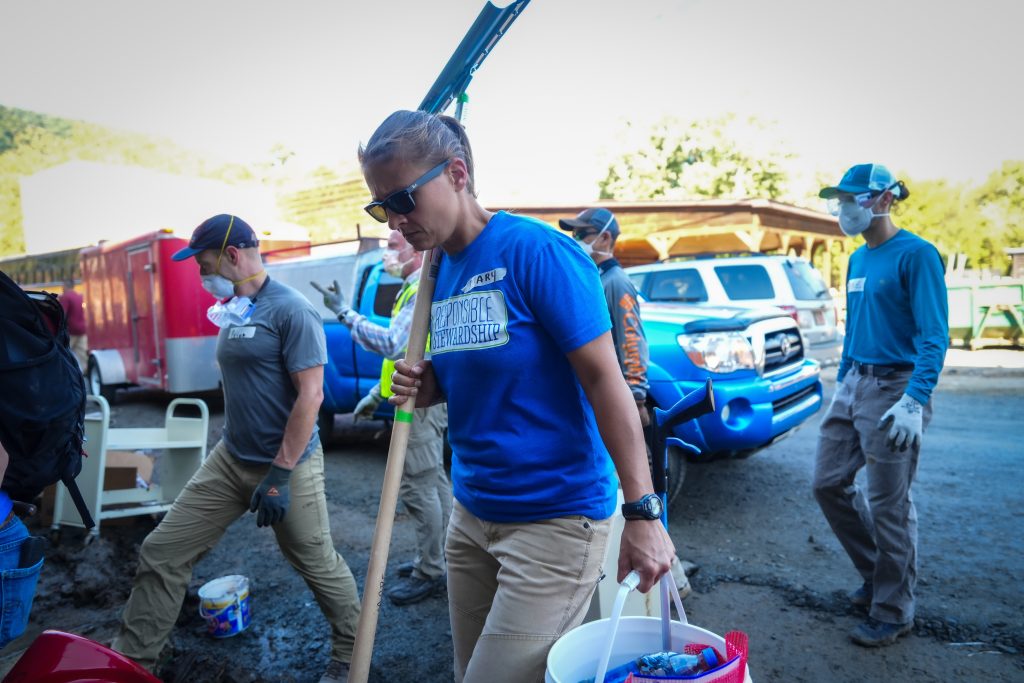
“’Sobering’ is one term that could be used,” he says of what they saw.
Smith still found some pride and joy driving the out-of-towners around and showing them different haunts from his youth, and he was surprised when some older locals with whom they spoke remembered him, his father or other family members. A few days later, caught up in that wave of nostalgia, Smith and several of his buddies, mostly from Greeneville High’s graduating classes of 1983 and 1984 and who call themselves the “Chill Daddies,” pooled resources and bought another truckload of supplies and delivered them together.
Also, making a welcome public return to the world of promoting live music, Smith was happy to announce a joint-effort benefit concert with WDVX that will be held at Yee-Haw Brewing Co. on Oct. 22. The stellar lineup will include Wyatt Ellis, Sierra Hull, Barry Bales and more.
“To cure the heartache and disbelief that comes with a tragedy that literally hits home like this one,” Smith says, “I will continue to help in ways that I can contribute best and keep sending positive energy and prayers to all of those affected.”
Newport
Liz Lyons, a former Knoxvillian and friend to many at this publication, is the director of Legacy Housing Foundation and a fairly new resident of Newport.
Without water and power or a way into downtown with the bridge that had provided access being washed out, she initially hunkered down at home with limited provisions, trying to figure out via social media what might be going on. In addition to her day job, Lyons is a landlord, so early efforts were spent checking on her tenants. An experienced photographer, too, she then flew a drone over downtown, capturing stunning images of the damage to that central zone.
“I never panicked, I always felt safe,” Lyons says, noting that she was more fortunate than many of her neighbors. “I’m an incredibly lucky person.”
When she had collected her bearings and regained better cell service, she connected with grassroots-organizing friends Rachel Williams and Anah Skelton, whom she knew from her Knoxville days and who coordinated and brought donated supplies for folks who needed them.
“They have helped coordinate more donations and volunteers than I can even keep track of,” Lyons says of Williams and Skelton. “People like those two girls kept things moving and helped meet the immediate needs of people.”
She then began engaging one of her top professional skills – fundraising – which she honed through multiple campaigns with nonprofits and organizations including WUTK when it was under the direction of Smith. As of this writing, Lyons had helped raise $55,000 thus far for Cocke County relief efforts.
“We want to be there with open arms when the volunteers go home,” she says, crediting folks like Jerry Cantrell and Phil Lawson for assisting in lifesaving and fundraising efforts. “It really has been wild to see so many people that I already knew were amazing humans just prove it again and again.”
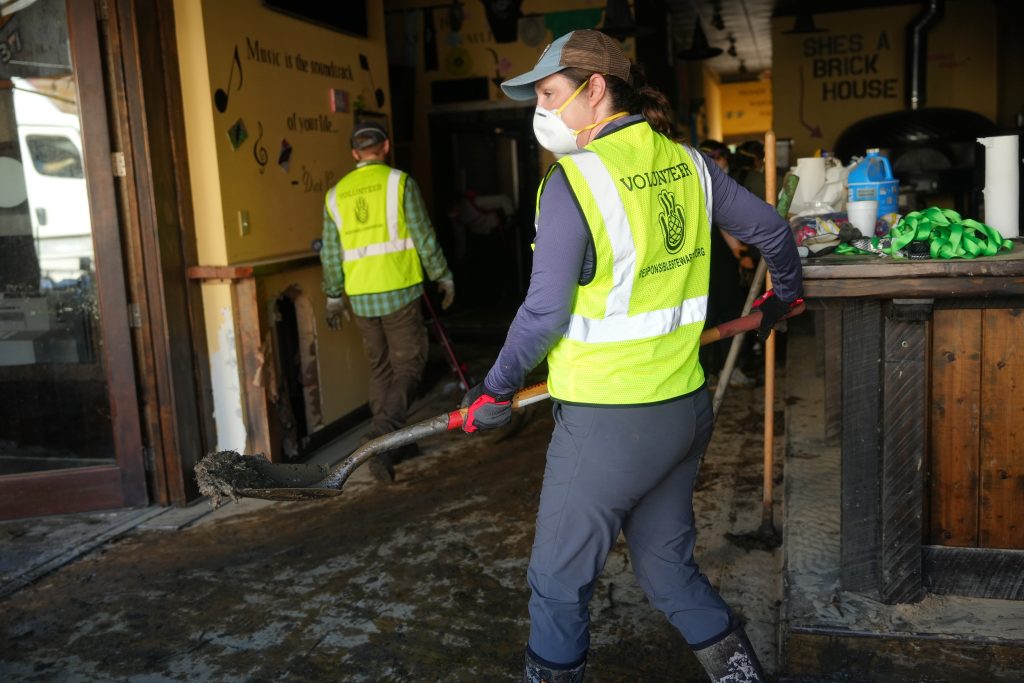
Kingsport
Kingsport sustained a bit of damage of its own, with sections of town losing power for a few days and water-system issues arising that necessitated a temporary boil advisory being put into effect. Although the city was largely unharmed, its close proximity to places like Erwin and Elizabethton, both of which suffered major destruction, made it an ideal staging ground for rescue groups to set out for those and other affected towns nearby.
The chamber of commerce hosted donation drives, as did multiple local churches and small businesses. Then there were the individuals who chipped in to help, as well.
Reid Burton, who owns Braeden’s Barbeque in midtown Kingsport, saw a need and immediately started delivering hot meals to where they were most needed, using up his entire food supply over the course of just a few days. He has announced plans to continue making Friday runs for the foreseeable future. Folks also started to coalesce around his business with multiple trucks of donated supplies, leaving from Braeden’s over the course of a several-day period. It became a nexus for food delivery that was expanded through the help of World Central Kitchen and a connection with Bush’s that resulted in a trailer of thousands of pounds of beans being donated and routed through Braeden’s to head toward smaller communities like Burnsville that Burton already was supplying.
Sarah Good is a teacher and coach at Dobyns-Bennett High School. After the storm, despite being in school only two days that week, she says D-B held a supply drive that collected hundreds of items and that students have also volunteered at Hampton Elementary and with loading trucks at Braeden’s. Good says that some of those students volunteered in remote North Carolina communities, as well, and some were stationed at Fender’s Farm in Jonesborough. She relays that some teachers have been working at the regional donation sorting center at Bristol Motor Speedway and have been helping in the onsite call center there. Good also says that several D-B teachers have had boots on the ground in Erwin and elsewhere in Union County clearing trees and debris.
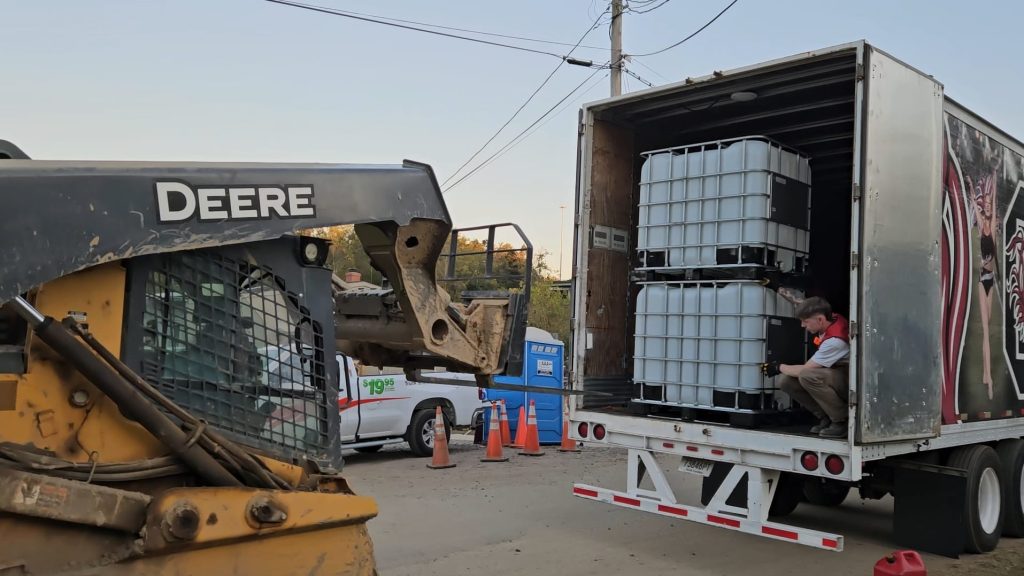
Johnson City
Johnson City is known for its tight-knit arts scene, and musicians in and around the college town immediately began to plan benefit shows in the aftermath of Helene.
49 Winchester, an alt-country band originally from Russell County, Virginia, has established itself nationally, having made appearances on late-night shows and having headlined major festivals like Bristol Rhythm & Roots Reunion. Johnson City is a market in which the group enjoyed early success, and it committed to a show at the Martin Center on Nov. 30 that will benefit Second Harvest Food Bank of Northeast Tennessee. Beloved Kingsport musician and former Tennessee Songwriters Week Competition winner Chancellor Lawson will open.
“49 Winchester is very proud to be from this region, and looking after each other is a huge part of the ethos of Appalachia,” bassist Chase Chafin says in advance of the concert. “When something tragic happens, it affects us all. We are doing this show at the end of the touring season in hopes of raising funds in support of the recovery efforts for our neighbors in Western North Carolina.”
Matthew Sykes is the frontman for The Kindest People, a hard-driving indie-rock band. The group, along with friend Lucille Klement, had previously scheduled gigs the weekend of the flood that they turned into impromptu benefit shows.
“It was really cool to see the community jump into action the very same day,” Sykes says. “And I’m super proud of what we’re doing here.”
Later, Sykes performed a show with Basement Days, Girl Scout Kegger and Glowing Pains at the Philosopher’s House on Oct. 11 in support of RISE Erwin. On Oct. 14, Klement, June Henry and I’ve Never Been Here Before joined up for a show at The Hideaway. Sykes created the poster for Appalachia Strong Music Festival, a daylong celebration on Oct. 19 in Abingdon, Virginia, which will benefit the people of Damascus, and he will take part in Appalachian Holler Help Concert Fundraiser, another all-day benefit event set for Oct. 26. That alluring spectacle will feature hometown star Amythyst Kiah, respected veteran musician Ed Snodderly and more.
“Our community has really pulled together in all this,” Sykes says. “I feel like Southern Appalachia is often overlooked on a national level, and if there’s one silver lining to this whole thing, it’s seeing that our communities do their best to take care of their own people.”
Knoxville
Cruz Contreras, a nationally renowned Americana artist who calls Maryville home and frequents the Knoxville music scene when he’s not out on tour, immediately started organizing loads to drive into small mountain communities following Helene’s path of destruction. He – along with Connor Kelly & The Time Warp, Mike McGill and the Refills and Daniel Fluitt of Thrift Store Cowboys (with Watchhouse’s Josh Oliver sitting in with all but Kelly and company) – also participated in the aforementioned BLANK-sponsored concert at Barley’s a week after the storm.
Several regular concert venues and establishments often featuring music, such as Preservation Pub and Central Flats & Taps, have served as ad-hoc donation centers, with their employees and other individuals representing Knoxville’s music scene making multiple runs to deliver those items and/or volunteer in affected areas. Many of these same folks are raising funds on their own and directing them to various reputable charities.
A few weeks later, The Bijou Theatre hosted Appalachian Allies, an event that featured locals Adeem The Artist, Andy Wood and R.B Morris along with travelers Darrell Scott, Jerry Douglas, Larkin Poe and Sarah Jarosz. The event was hosted by Daniel Kimbro and Sam Lewis and was livestreamed for those who couldn’t attend. According to Kimbro, a single donor from Mississippi donated $25,000 and a dinner hosted by Martha Boggs at Bistro by the Bijou raised “right at $10,000.”
Overall, the event raised over $100,000 for the East Tennessee Foundation. The funds specifically went to the East Tennessee Foundation’s Neighbor to Neighbor Disaster Relief Fund, supporting both immediate and long-term recovery efforts in the region.
Nashville
Dusty Slay is a Southern-fried standup comedian who has enjoyed breakout success on tour, on late-night TV and on social media, and he is now paying it forward by throwing a benefit show at the Ryman Auditorium on Oct. 21.
“I am proud to be a part of this show with my friends, using comedy to support those who have lost so much,” he says. “Together, I’m hopeful we can make a difference, with all the proceeds going to Mountain Ways, a nonprofit dedicated to bringing aid to those affected by this devastating storm.”
Asheville, North Carolina
BeLoved Asheville
“Our mission is to bring people together with home health equity and dignity for all,” says Amy Cantrell, a co-director of BeLoved Asheville, a nonprofit that has been on the ground in Asheville for the past 15 years.
The group provides public-policy advocacy, cultural celebrations in neighborhoods and free farmers’ markets to “get fresh healthy food out to people who need it most,” says Cantrell, adding that much of its work is with children and families and “centers around community. … Community is a really powerful glue that holds us together and helps us come up with innovative solutions.”
The group did big rapid-response work during the COVID pandemic and other emergencies, and Hurricane Helene is no different.
“This is definitely the biggest thing we’ve ever done,” Cantrell says, noting that the group is reaching as many as 15,000 people per day with meals and other services. She says that many of the recipients are the “most impacted and most vulnerable” folks: those living in remote areas, mobile-home communities, apartment complexes for the elderly and the like.
“In the early days, we were hiking in to get stuff to people,” Cantrell says, but now they’re working on water infrastructure for schools and neighborhoods.
Individual donors, community foundations and benefit events have helped fund some of BeLoved’s efforts. The group has had as many as 100 people per day on their volunteer team, too, which has improved its capabilities.
‘We’re committed to be here for the long haul, which will take years,” Cantrell acknowledges. “We’re deeply moved by the incredible outpouring of folks driving in things that helped us survive. Our deepest support is people from outside the disaster area who have come to our aid, and it’s very moving. There’s a lot of trauma and death … so having folks coming from Knoxville, Charlotte, Ohio, New York – I could name probably every state in the nation at this point; it’s just been incredible. … It’s very healing for us.
“This is the best of humanity, showing up for each other. When it’s your turn in the eye of the storm, we will show up for you. If all the world is watching Western North Carolina, let’s inspire people to show up for each other and take care of each other like this.”
Andrew Scotchie
Andrew Scotchie is a popular Asheville musician who tours nationally with his band the River Rats, and he also has been employed part-time at the Orange Peel for around a decade. He’d recently returned from the Shakori Hills GrassRoots Festival in Pittsboro in Chatham County when the storm hit. Scotchie saw much of the destruction it wrought, but he also witnessed the helping spirit among community members from the get-go.
“It’s been heartbreaking; it’s been inspiring,” he says. “Everyone’s experiencing a broad spectrum of emotion.
Scotchie first saw neighbors helping one another get situated and then taking stock of needs. Then, he says, a mixture of forces – businesses, churches, individuals, government forces – began to coalesce, with aid and donation stations popping up everywhere. He mentions World Central Kitchen setting up at points around town to feed people, as well as venues like Grey Eagle, Asheville Music Hall and Burial Beer Co. among others offering free food and drink while supplies lasted. His own employer, the Orange Peel, set up a makeshift donation center.
Scotchie credits Josh Blake with Wicked Weed’s Funkatorium for getting shows up and running quickly to help musicians and music fans begin to heal through the catharsis of live music. “Music is healing,” as he maintains. He also says he’s thankful for MusiCares, a program sponsored by the GRAMMY Foundation that helps professional artists and musicians with funds and support during emergency disruptions to their industry.
Scotchie says there was definite evidence of government action, and he’s proud of several local entities, too. “People helping each other,” he says. “It’s not one organization; it’s a joint effort.”
Julie Mayfield
Sen. Julie Mayfield has represented District 49, which encompasses Asheville, since 2020. She sent out storm-preparation emails to constituents in advance of Helene, but she was just as surprised and overwhelmed by its ferocity and impact on the area she represents as everyone else. Mayfield responded quickly, however, diving into her political duties immediately after surveying her immediate surroundings and checking on neighbors and family.
“Friday for me was checking on some folks … friends … watching the flooding unfold,” she says. “It was really weird: You could literally watch the water rise,” which soon left the city “physically on an island.”
Still, as Mayfield spoke to more people and continued to learn about the unfolding situation, she was encouraged by the massive and immediate grassroots efforts among neighbors. “It’s been enormous,” she says, citing how businesses, the nonprofit community and churches alike leapt into action. “The outpouring of neighborly support has been huge.” Before state and federal resources could arrive, she says, “neighbors had to help each other.”
Mayfield spent Saturday morning ensuring that her mother was safe before heading to the emergency operations center opened by the city of Asheville in a fire station north of town. Arms open, she implored those there, “Tell me what to do.”
Soon, local, state and federal forces triaged in the operations center. Mayfield, a Democrat, discovered that the tension normally present between her and her colleagues from across the political aisle ceased to exist in that moment. Republican state legislators checked on her and offered help, which she found touching. “In times like these, it doesn’t matter,” she says of the usual partisan divide.
By the Wednesday after the flood, the state legislature had passed a massive bipartisan relief bill amounting to $273 million to “facilitate cash flow to state agencies and local governments,” as Mayfield notes. However, although trustworthy outlets delivered accurate reporting regarding the difficulties facing the people of her district, the senator was dismayed by the mis- and disinformation that proliferated on social-media platforms. She took particular exception to criticism of the Federal Emergency Management Agency, noting that while it’s a federal department, it comprises many part-time workers who live in and around Asheville.
“It’s just flat wrong,” Mayfield says about false claims of the agency being absent. “FEMA is completely embedded here and throughout the region. They drop their lives …” she trails off, tearing up. “I get emotional about it. They dropped everything to come take care of us, and they are from among us.”
Mayfield also dispels the rumor about FEMA allotting only $750 to each household, noting that this amount is just an initial, immediately payable sum that can be supplemented after applying for further aid.
Mayfield concedes that help may have been slower to reach the remote rural hollers and understands why folks there may be frustrated. For people outside of the region looking in and trying to discern the truth of the situation, though, she urges them to exercise caution, critical thinking and good judgment.
“No one should believe anything on Facebook if the person posting doesn’t live here,” she says.
Western North Carolina
While early media coverage and social media posts tended to focus on what was going on in Asheville, large-scale devastation had occurred throughout the remote hills and valleys of small-town and rural Western North Carolina.
Josh Carroll, a small-business owner in Big Stone Gap, Virginia, describes himself as a regular guy with a natural curiosity regarding weather. Starting out tracking Helene, he and his wife then began wondering about how one of their favorite travel destinations, Asheville, was faring. Seeing some initial posts and reports about the level of devastation that had occurred, he immediately reached out to his local community via social media. Within 24 hours, he says, the town pitched in to provide enough supplies to fill up the back of their truck and a trailer.
Carroll’s wife was a “pro navigator,” he says, consulting static maps on her phone instead of GPS or internet directions, which were nonfunctioning. Together, they embarked on a journey that soon had them off the already collapsed I-26 and onto winding mountain traverses like Rock Creek Road through Erwin and over the mountain into rural Western North Carolina communities. They frequently encountered downed trees along the way, though many had already been cleared by locals.
Carroll says he doesn’t consider himself a military-level orienteer, admitting, “I’m bad with directions, and I always have been.” However, as a lover of the outdoors, he asserts that he has “always been in touch with nature.” Extensive travel through the region has resulted in an intimate knowledge of its roadways and an understanding of its denizens. “These people are going to need help,” Carroll recalls he and his wife murmuring to each other as they passed through the area so soon after Helene had decimated it.
The farthest they made it on their first run was to Little Switzerland, but earlier on the journey, in a small community called Poplar, some of the first folks they’d seen turned out to be a worried older couple that had lost power. Carroll promised in his mind he’d find that couple a generator, a promise that he began to obsess about as they returned home and he began communicating with friends and other folks in an effort to source items.
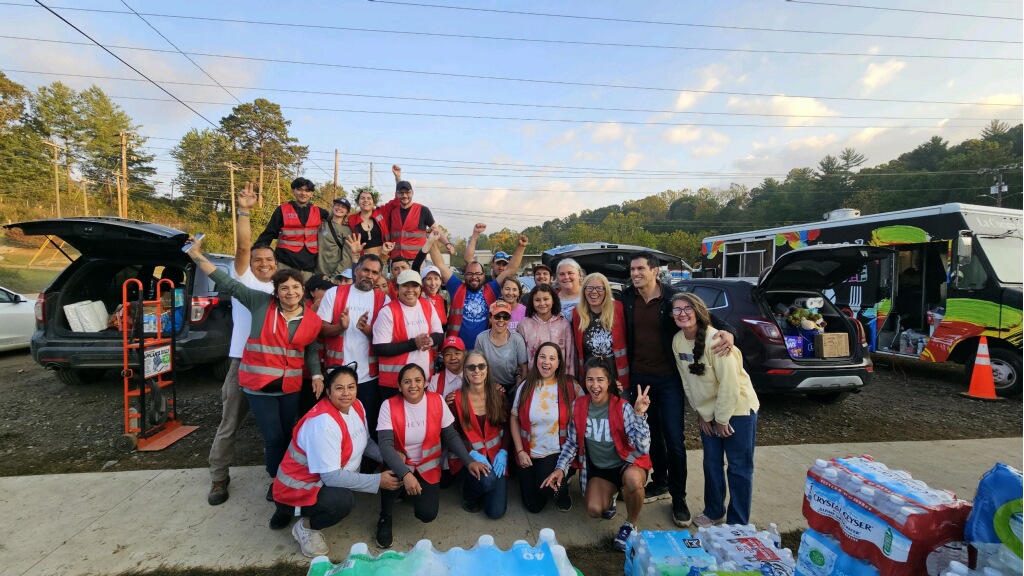
On the next excursion, they came upon a small church in Spruce Pine where Carroll walked in and started bartering with what he had. His first question was where he could find a generator. Without even vetting him or knowing his intentions, a woman there told him to take a brand-new unit that had just been dropped off. In exchange, they left some medical supplies that had been donated from their community in Southwest Virginia and asked what else was needed. The same woman who offered him the generator mentioned a local clinic that couldn’t reopen without power, and that got Carroll’s gears turning.
They couple asked folks in Little Switzerland what they had and what was needed, as well. They were directed to a woman who was leading the donation operations there, and the moment he mentioned Poplar, she loaded them down with supplies like propane, gas and extension cords that she knew they’d need to deliver based on conversations she’d had with friends.
“It was like everything started falling perfectly into place, and from there we knew we had the supplies to go back to Poplar,” Carroll says.
They returned to the elderly couple and gave them the generator. As they were leaving, the wife scurried behind Carroll as he spoke with her husband. There was a little bush on the side of a bank from which she plucked two beautiful flowers. Presenting one to his wife, she hugged her and said, “I love you.” She repeated the process with Carroll. Leaving the couple with a few extra supplies, Carroll and his wife headed back to the church in Spruce Pine to offload the rest of what they had. Then they returned home in silence, trying to process all that they’d seen and figure out the next steps.
Though he returned to his day job the next morning, Carroll says he couldn’t concentrate, recalling how he had woken up with a burning desire to keep providing help to folks in need. He expressed to his employee, a friend, how his thoughts kept returning to Western North Carolina. They scrambled to fulfill work obligations so that Carroll could close up shop. Over the course of the couple days, he coordinated with numerous entities to procure generators, propane heaters, extension cords, heavy equipment and all manner of other supplies, and he and his friend set out to distribute all of it.
This next trip was an epic, still-ongoing journey on which the pair has experienced both apocalyptic destruction and the resolute determination of rural mountain folk rising up and supporting each other. Massive grassroots efforts from individuals from all over the country who have managed to access and provide assistance to ground zero have been matched by remarkable private and governmental contributions. People of all stripes – from regular people to household names, Carroll says – have gotten personally involved and lent their energies to the herculean task of cleaning up and rebuilding after this unprecedented disaster.
With the backing of folks in Big Stone Gap and countless other communities along the way, Carroll and his compatriots have been able to drive farther into more remote areas and push themselves even further. One night, he says, he and his friend took a wrong turn and came upon a vision that felt symbolic, nigh prophetic to him: a truck wrapped around a pole next to a demolished church – but with an American flag and a Christian flag still standing tall on poles leaned against what little was left of the front of the building.
Carroll says that the scene reminded him all over again why he and so many others are undertaking these recovery efforts. While taking a breather in a cow pasture near a washed-out road the last time we spoke – he hasn’t left the area he’s currently in for over a week now and doesn’t really know when he might – Carroll assessed his surroundings before offering the following:
“These people are going to need help for a long time. When the mountains are calling, we must go.”
Throughout the region, there are countless groups collecting donations and/or offering ways to help folks in need. We recommend that our readers consider their resources and evaluate their skillsets and try to match them according to the material/logistical needs of the people on the ground asking for donations and/or assistance. We encourage folks to do what they can for their neighbors in this trying time, though we entreat you to do it in a measured, respectful manner and on their terms rather than your own.
This is an ongoing story that will be updated on our website in the weeks and months to come.
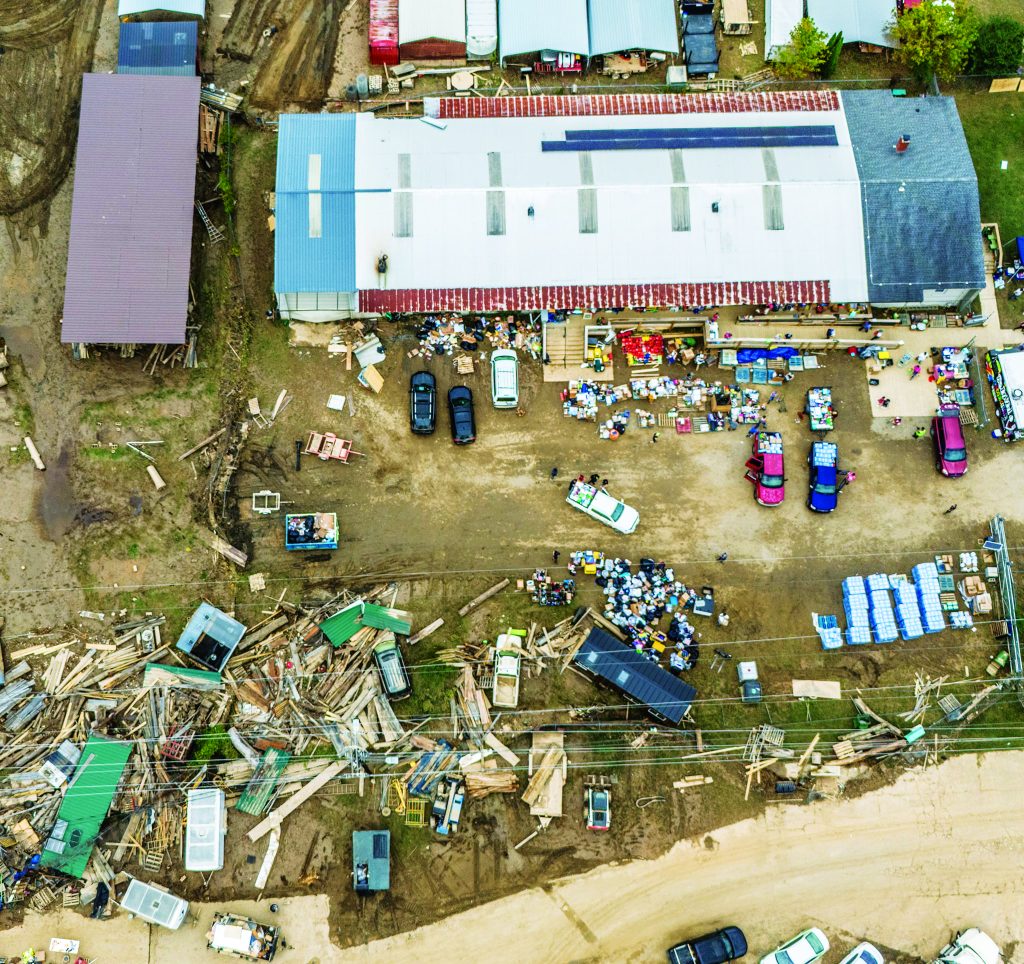
luke@blanknews.com





